英语语言学习策略量表SILL
初中生英语学习策略评价表
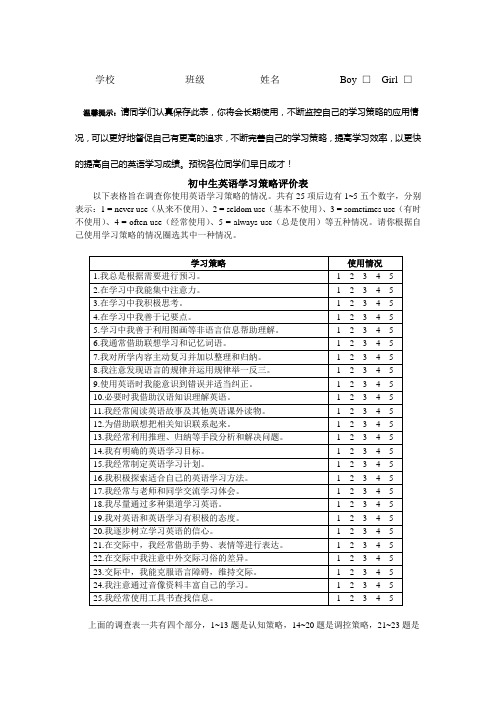
学校__________ 班级_________ 姓名__________ Boy □Girl □温馨提示:请同学们认真保存此表,你将会长期使用,不断监控自己的学习策略的应用情况,可以更好地督促自己有更高的追求,不断完善自己的学习策略,提高学习效率,以更快的提高自己的英语学习成绩。
预祝各位同学们早日成才!初中生英语学习策略评价表以下表格旨在调查你使用英语学习策略的情况。
共有25项后边有1~5五个数字,分别表示:1 = never use(从来不使用)、2 = seldom use(基本不使用)、3 = sometimes use(有时不使用)、4 = often use(经常使用)、5 = always use(总是使用)等五种情况。
请你根据自己使用学习策略的情况圈选其中一种情况。
学习策略使用情况1.我总是根据需要进行预习。
1 2 3 4 52.在学习中我能集中注意力。
1 2 3 4 53.在学习中我积极思考。
1 2 3 4 54.在学习中我善于记要点。
1 2 3 4 55.学习中我善于利用图画等非语言信息帮助理解。
1 2 3 4 56.我通常借助联想学习和记忆词语。
1 2 3 4 57.我对所学内容主动复习并加以整理和归纳。
1 2 3 4 58.我注意发现语言的规律并运用规律举一反三。
1 2 3 4 59.使用英语时我能意识到错误并适当纠正。
1 2 3 4 510.必要时我借助汉语知识理解英语。
1 2 3 4 511.我经常阅读英语故事及其他英语课外读物。
1 2 3 4 512.为借助联想把相关知识联系起来。
1 2 3 4 513.我经常利用推理、归纳等手段分析和解决问题。
1 2 3 4 514.我有明确的英语学习目标。
1 2 3 4 515.我经常制定英语学习计划。
1 2 3 4 516.我积极探索适合自己的英语学习方法。
1 2 3 4 517.我经常与老师和同学交流学习体会。
基于OXFORD’SSILL量表的中职学生英语学习策略调查分析-最新教育文档
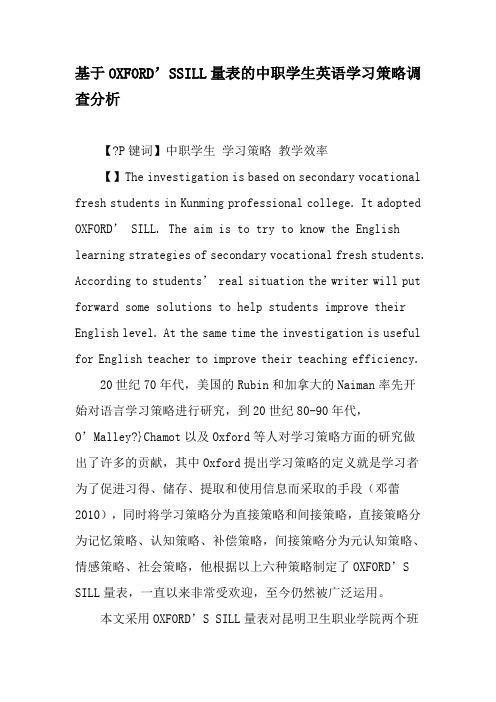
基于OXFORD’SSILL量表的中职学生英语学习策略调查分析【?P键词】中职学生学习策略教学效率【】The investigation is based on secondary vocational fresh students in Kunming professional college. It adopted OXFORD’ SILL. The aim is to try to know the English learning strategies of secondary vocational fresh students.A ccording to students’ real situation the writer will put forward some solutions to help students improve their English level. At the same time the investigation is useful for English teacher to improve their teaching efficiency.20世纪70年代,美国的Rubin和加拿大的Naiman率先开始对语言学习策略进行研究,到20世纪80-90年代,O’Malley?}Chamot以及Oxford等人对学习策略方面的研究做出了许多的贡献,其中Oxford提出学习策略的定义就是学习者为了促进习得、储存、提取和使用信息而采取的手段(邓蕾2010),同时将学习策略分为直接策略和间接策略,直接策略分为记忆策略、认知策略、补偿策略,间接策略分为元认知策略、情感策略、社会策略,他根据以上六种策略制定了OXFORD’S SILL量表,一直以来非常受欢迎,至今仍然被广泛运用。
本文采用OXFOR D’S SILL量表对昆明卫生职业学院两个班的中职新生进行问卷调查,发出100份问卷,收回100份问卷,量表中的问题都是已翻译成中文,方便学生作答,在问卷调查之前由任课教师对量表中的问题进行解释并详细告知学生作答的注意事项。
中学生学习策略量表(LASSI)
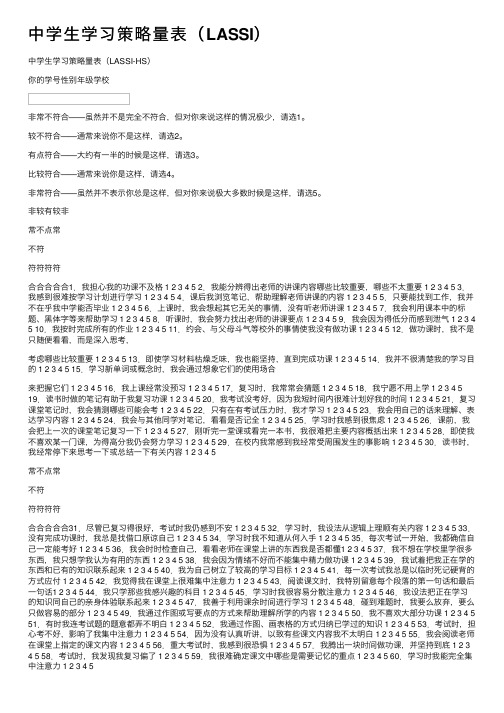
中学⽣学习策略量表(LASSI)中学⽣学习策略量表(LASSI-HS)你的学号性别年级学校⾮常不符合——虽然并不是完全不符合,但对你来说这样的情况极少,请选1。
较不符合——通常来说你不是这样,请选2。
有点符合——⼤约有⼀半的时候是这样,请选3。
⽐较符合——通常来说你是这样,请选4。
⾮常符合——虽然并不表⽰你总是这样,但对你来说极⼤多数时候是这样,请选5。
⾮较有较⾮常不点常不符符符符符合合合合合1.我担⼼我的功课不及格 1 2 3 4 5 2.我能分辨得出⽼师的讲课内容哪些⽐较重要,哪些不太重要 1 2 3 4 5 3.我感到很难按学习计划进⾏学习 1 2 3 4 5 4.课后我浏览笔记,帮助理解⽼师讲课的内容 1 2 3 4 5 5.只要能找到⼯作,我并不在乎我中学能否毕业 1 2 3 4 5 6.上课时,我会想起其它⽆关的事情,没有听⽼师讲课 1 2 3 4 5 7.我会利⽤课本中的标题、⿊体字等来帮助学习 1 2 3 4 5 8.听课时,我会努⼒找出⽼师的讲课要点 1 2 3 4 5 9.我会因为得低分⽽感到泄⽓ 1 2 3 4 5 10.我按时完成所有的作业 1 2 3 4 5 11.约会、与⽗母⽃⽓等校外的事情使我没有做功课 1 2 3 4 5 12.做功课时,我不是只随便看看,⽽是深⼊思考,考虑哪些⽐较重要 1 2 3 4 5 13.即使学习材料枯燥乏味,我也能坚持,直到完成功课 1 2 3 4 5 14.我并不很清楚我的学习⽬的 1 2 3 4 5 15.学习新单词或概念时,我会通过想象它们的使⽤场合来把握它们 1 2 3 4 5 16.我上课经常没预习 1 2 3 4 5 17.复习时,我常常会猜题 1 2 3 4 5 18.我宁愿不⽤上学 1 2 3 4 5 19.读书时做的笔记有助于我复习功课 1 2 3 4 5 20.我考试没考好,因为我短时间内很难计划好我的时间 1 2 3 4 5 21.复习课堂笔记时,我会猜测哪些可能会考 1 2 3 4 5 22.只有在有考试压⼒时,我才学习 1 2 3 4 5 23.我会⽤⾃⼰的话来理解、表达学习内容 1 2 3 4 5 24.我会与其他同学对笔记,看看是否记全 1 2 3 4 5 25.学习时我感到很焦虑 1 2 3 4 5 26.课前,我会把上⼀次的课堂笔记复习⼀下 1 2 3 4 5 27.刚听完⼀堂课或看完⼀本书,我很难把主要内容概括出来 1 2 3 4 5 28.即使我不喜欢某⼀门课,为得⾼分我仍会努⼒学习 1 2 3 4 5 29.在校内我常感到我经常受周围发⽣的事影响 1 2 3 4 5 30.读书时,我经常停下来思考⼀下或总结⼀下有关内容 1 2 3 4 5常不点常不符符符符符合合合合合31.尽管已复习得很好,考试时我仍感到不安 1 2 3 4 5 32.学习时,我设法从逻辑上理顺有关内容 1 2 3 4 5 33.没有完成功课时,我总是找借⼝原谅⾃⼰ 1 2 3 4 5 34.学习时我不知道从何⼊⼿ 1 2 3 4 5 35.每次考试⼀开始,我都确信⾃⼰⼀定能考好 1 2 3 4 5 36.我会时时检查⾃⼰,看看⽼师在课堂上讲的东西我是否都懂1 2 3 4 5 37.我不想在学校⾥学很多东西,我只想学我认为有⽤的东西 1 2 3 4 5 38.我会因为情绪不好⽽不能集中精⼒做功课 1 2 3 4 5 39.我试着把我正在学的东西和已有的知识联系起来 1 2 3 4 5 40.我为⾃⼰树⽴了较⾼的学习⽬标 1 2 3 4 5 41.每⼀次考试我总是以临时死记硬背的⽅式应付 1 2 3 4 5 42.我觉得我在课堂上很难集中注意⼒ 1 2 3 4 5 43.阅读课⽂时,我特别留意每个段落的第⼀句话和最后⼀句话1 2 3 4 5 44.我只学那些我感兴趣的科⽬ 1 2 3 4 5 45.学习时我很容易分散注意⼒ 1 2 3 4 5 46.我设法把正在学习的知识同⾃⼰的亲⾝体验联系起来 1 2 3 4 5 47.我善于利⽤课余时间进⾏学习 1 2 3 4 5 48.碰到难题时,我要么放弃,要么只做容易的部分 1 2 3 4 5 49.我通过作图或写要点的⽅式来帮助理解所学的内容 1 2 3 4 5 50.我不喜欢⼤部分功课 1 2 3 4 5 51.有时我连考试题的题意都弄不明⽩ 1 2 3 4 5 52.我通过作图、画表格的⽅式归纳已学过的知识 1 2 3 4 5 53.考试时,担⼼考不好,影响了我集中注意⼒ 1 2 3 4 5 54.因为没有认真听讲,以致有些课⽂内容我不太明⽩ 1 2 3 4 5 55.我会阅读⽼师在课堂上指定的课⽂内容 1 2 3 4 5 56.重⼤考试时,我感到很恐惧 1 2 3 4 5 57.我腾出⼀块时间做功课,并坚持到底 1 2 3 4 5 58.考试时,我发现我复习偏了 1 2 3 4 5 59.我很难确定课⽂中哪些是需要记忆的重点 1 2 3 4 5 60.学习时我能完全集中注意⼒ 1 2 3 4 5常不点常不符符符符符合合合合合61.我会利⽤章节的标题找出课⽂中的重点 1 2 3 4 5 62.考试时我很紧张,因⽽没有发挥出我应有的⽔平 1 2 3 4 5 63.我死记语法规则、术语和公式等,根本没有理解它们 1 2 3 4 5 64.我经常考⾃⼰,确信我已经掌握了所学的内容 1 2 3 4 5 65.我经常拖延作业 1 2 3 4 5 66.我设法弄清楚我所学的东西在⽇常⽣活应如何发挥效⽤ 1 2 3 4 5 67.做功课时我容易⾛神 1 2 3 4 5 68.在我看来,课堂上教的东西没有什么⽤处 1 2 3 4 5 69.复习时,我浏览以前所做的作业 1 2 3 4 5 70我不懂得⽤不同的⽅法去学习不同的科⽬ 1 2 3 4 5 71.做功课时我会迷失于细节中,找不到要点 1 2 3 4 5 72.如果有机会,我会去听专门的复习课 1 2 3 4 5 73.我把太多的时间⽤于交友,以致耽误了功课 1 2 3 4 5 74.考试时或写作⽂时,我发现⾃⼰会错了题意,因⽽丢了分 1 2 3 4 5 75.我设法把我正在学习的各种概念联系起来 1 2 3 4 5 76.阅读时我很难找到重点 1 2 3 4 5 77、我能⾃⼰掌握学习时间。
英语学习策略调查问卷
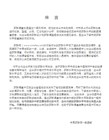
Strategies Inventory for Language Learning (SILL) Version for Speaking of Other Language Learning EnglishDirections:This form of the Strategy Inventory For Language Learning (SILL) is for students of English as a second or foreign language. You will find statements about learning English. Please read each statement. On the separate Worksheet, write the response (1,2,3, 4,or 5) that tells How true of You this Statement Is.1. Never or almost never true of me2. Usually not true of me3. Somewhat true of me4. usually true of me5. Always or almost true of meNever or almost never true of me means that the statement is very rarely true of you;Usually not true of means that the statement is true less than half the time;Somewhat true of me means the statement is true of you about half the time;Usually true of me means the statement is true more than half the time;Always or almost true of me means the statement is true of you almost always.Answer in terms of How well the statement describes you. Do not answer how you think you should be, or what other people do. There are no right or wrong answers to these statements. Put your answers on the separate Worksheet. Please make no marks to the items. Work as quickly as you can without being careless. This usually takes about 20-30 minutes to complete. If you have any questions, let the teacher know immediately.Part A1. I think of relationship between what I already know and new things I learn in English.2. I use new English words in a sentence so I can remember them.3. I connect the sound of a new English word and an image or picture of the word to help me remember the word.4. I remember a new English word by making a mental picture of a situation in which the word might be used.5. I use rhymes to remember new English words.6. I use flashcards to remember new words.7. I physically act out new English words.8. I review English lessons often.9. I remember new English words or phrases by remembering their location on the page, on the board, or on a street sign.Part B10. I say or write new English words several times.11. I try to talk like native English speakers.12. I practice the sounds of English.13. I use the English words I know in different ways.14. I start conversations in English.15. I watch English language TV shows spoken in English or go to movies spoken in English.16. I read for pleasure in English.17. I write notes, messages, letters, or reports in English.18. I fist skim an English passage (read over the passage quickly), then go back and read carefully.19. I look for words in my own language that are similar to new words in English.20. I try to find patterns in English.21. I find the meaning of an English word by dividing it into parts that I understand.22. I try not to translate word-for-word.23. I make summaries of information that I hear or read in English.Part C24. To understand unfamiliar English words, I make guesses.25. when I can’t think of a word during a conversation in English, I use gestures.26. I make up new words if I do not know the right ones in English.27. I read English without looking up every new word.28. I try to guess what the other person will say next in English.29. if I can’t think of an English word, I use a word or phrase that means the same thing.Part D30. I try to find as many ways as I can to use my English.31. I notice my English mistakes and use that information to help me better.32. I pay attention when someone is speaking English.33. I try to find out how to be a better learner of English.34. I plan my schedule so I will have enough time to study English.35. I look for people I can talk to in English.36. I look for opportunities to read as much as possible in English.37. I have clear goals for improving my English skills.38. I think about my progress in learning English.Part E39. I try to relax whenever I feel afraid of using English.40. I encourage myself to speak English even when I am afraid of making a mistake.41. I give myself a reward or treat when I do well in English.42. I notice if I am tense or nervous when I am studying or using English.43. I write down my feelings in a language learning diary.44. I talk to someone else about how I feel when I am learning English.Part F45. If I don’t understand something in English, I ask the other person to slow down or say it again.46. I ask English speakers to correct me when I talk.47. I practice English with other students.48. I ask for help from English speakers.49. I ask questions in English.50. I try to learn about the culture of English speakers.Strategy inventory for language learningYour name__________ Date______Worksheet for Answering and Scoring1. Write your response to each item (that is 1,2,3,4 or5) in each of the blanks.2. Add up each column. Put the result on the line marked Sum.3. Divide by number under SUM to get the average for each column. Round this average off to the nearest tenth, as in 3.44. Figure out your overall average. To do this, add up all the SUMs for the different parts of the SILL. Then divide by 50.5. When you have finished, your teacher will give you the Profile of Results. Copy your averages (for each part and for the whole SILL) from the Worksheet to the Profile.Part A Part B Part C Part D Part E Part F1.____ 10. ____ 24. ____ 30. ____ 39. ____ 45. ____2.____ 11. ____ 25. ____ 31. ____ 40. ____ 46. ____3.____ 12. ____ 26. ____ 32. ____ 41. ____ 47. ____4.____ 13. ____ 27. ____ 33. ____ 42. ____ 48. ____5.____ 14. ____ 28. ____ 34. ____ 43. ____ 49. ____6.____ 15. ____ 29. ____ 35. ____ 44. ____ 50. ____7.____ 16. ____ 36. ____8.____ 17. ____ 37. ____9.____ 18. ____ 38. ____19. ____20. ____21. ____22. ____23. ____A B C D E F TOTALSUM____ SUM____ SUM____ SUM____ SUM____ SUM____ SUM____/9=_____ /14 =_____ /6=_____ /9=_____ /6 =_____ /6 =_____ /50=_____(Overall Average)Appendix 2学习策略调查问卷说明:阅读下列陈述,然后请你根据自己的实际情况做出选择。
基于SILL的阿拉伯留学生在华英语学习策略实证研究
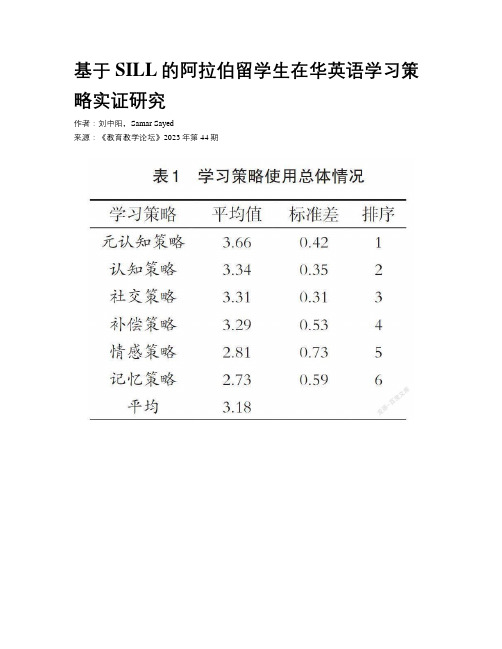
基于SILL的阿拉伯留学生在华英语学习策略实证研究作者:刘中阳,Samar Sayed来源:《教育教学论坛》2023年第44期[摘要]我國高校阿拉伯留学生的数量不断增加,英语作为其日常学习交流的主要语言,重要性不言而喻。
通过Oxford语言学习策略量表(SILL),对阿拉伯留学生英语学习过程中的元认知、认知、社交、补偿、情感、记忆等六个方面策略的使用频率,了解阿拉伯留学生在我国这样的非英语国家进行专业课程学习时的英语学习策略,结果发现元认知策略是最常用的策略,而记忆策略很少被主动用到。
因此,在英语课堂上,教师可以考虑充分调动学生的积极性,使其日常所用和所学相结合,进一步提升学习效果。
[关键词]阿拉伯留学生;SILL;英语学习策略;中国;EFL[基金项目] 2021年度全国翻译专业学位研究生教育指导委员会教育研究项目“水利水电专业翻译术语库建设与应用案例研究”(MTIJZW202145);2018年度陕西省哲学社会科学规划办公室项目“精力分配模式下科技语料交传语码重组制约因素实证研究及自主学习库建立”(2018M12);2020年度西安理工大学教育教学改革重点项目“‘一流专业’背景下《科技英语口译》数字化课程教学资源库建设” (xjy2009)[作者简介]刘中阳(1977—),女,陕西西安人,硕士,西安理工大学人文与外国语学院副教授,硕士生导师,主要从事教学法、翻译理论与教学研究;Samar Sayed(1989—),女,埃及人,硕士,西安理工大学人文与外国语学院2018级外国语言文学专业硕士研究生,研究方向为语言学及应用语言学。
[中图分类号] G642.1;G791 [文献标识码] A [文章编号] 1674-9324(2023)44-0030-06 [收稿日期] 2022-06-10引言随着我国“一带一路”政策的深入贯彻实施,国内高校阿拉伯留学生的数量激增,国际交流工作蓬勃发展。
笔者调查研究了阿拉伯留学生从母语EFL(English as the Foreign Language)国家到非母语EFL国家之后,英语作为主要交流语言,其在国内的英语学习情况,以及对英语学习策略所展现出的倾向性。
英语专业学生学习策略英语水平关系实证论文
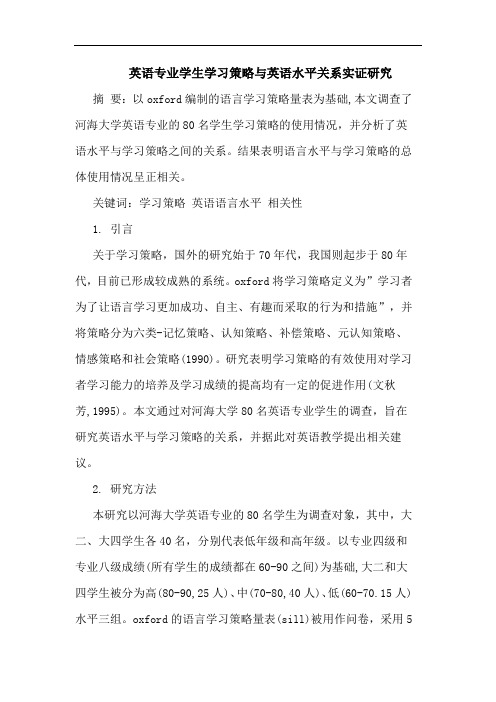
英语专业学生学习策略与英语水平关系实证研究摘要:以oxford编制的语言学习策略量表为基础,本文调查了河海大学英语专业的80名学生学习策略的使用情况,并分析了英语水平与学习策略之间的关系。
结果表明语言水平与学习策略的总体使用情况呈正相关。
关键词:学习策略英语语言水平相关性1. 引言关于学习策略,国外的研究始于70年代,我国则起步于80年代,目前已形成较成熟的系统。
oxford将学习策略定义为”学习者为了让语言学习更加成功、自主、有趣而采取的行为和措施”,并将策略分为六类-记忆策略、认知策略、补偿策略、元认知策略、情感策略和社会策略(1990)。
研究表明学习策略的有效使用对学习者学习能力的培养及学习成绩的提高均有一定的促进作用(文秋芳,1995)。
本文通过对河海大学80名英语专业学生的调查,旨在研究英语水平与学习策略的关系,并据此对英语教学提出相关建议。
2. 研究方法本研究以河海大学英语专业的80名学生为调查对象,其中,大二、大四学生各40名,分别代表低年级和高年级。
以专业四级和专业八级成绩(所有学生的成绩都在60-90之间)为基础,大二和大四学生被分为高(80-90,25人)、中(70-80,40人)、低(60-70.15人)水平三组。
oxford的语言学习策略量表(sill)被用作问卷,采用5分制。
平均得分在1.0-2.4:使用很少;2.5-3.4:使用一般;3.5-5.0:使用频繁。
数据统计前对问卷进行了内在一致性分析,信度系数为0.90。
本次调查共发放问卷80份,回收率100%,回收的数据使用spss16.0分析。
3. 结果与讨论3.1. 英语水平与学习策略的总体使用情况注: *p<0.05,**p<0.01如表1所示,80名受试者学习策略的总体使用情况为”一般”,且英语水平与学习策略的总体使用情况显著正向相关(sig.<0.05),这一结果与green & oxford的研究结果有着明显的相同之处(1995)。
语言学习策略 Some Strategies to Learn a Foreign Language_英语作文
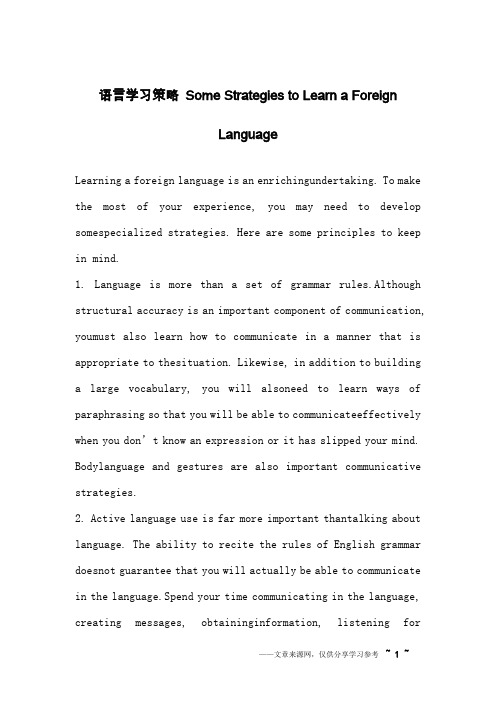
语言学习策略Some Strategies to Learn a ForeignLanguageLearning a foreign language is an enrichingundertaking. To make the most of your experience, you may need to develop somespecialized strategies. Here are some principles to keep in mind.1. Language is more than a set of grammar rules.Although structural accuracy is an important component of communication, youmust also learn how to communicate in a manner that is appropriate to thesituation. Likewise, in addition to building a large vocabulary, you will alsoneed to learn ways of paraphrasing so that you will be able to communicateeffectively when you don’t know an expression or it has slipped your mind. Bodylanguage and gestures are also important communicative strategies.2. Active language use is far more important thantalking about language. The ability to recite the rules of English grammar doesnot guarantee that you will actually be able to communicate in the language.Spend your time communicating in the language, creating messages, obtaininginformation, listening fordetails and so on.3. Don’t be afraid of making errors. Errors are anatural part of the language learning process and no one can avoid them. Do notlet fear of making an error prevent you from communicating. Even if yourlanguage ability is not perfect, your message may be understood. Of course,accurate use of language is an appropriate goal of language study.4. Language learning is a long-time process. Thereforeyou must have realistic expectations of your performance after one semester,one year, or several years of language learning. Advanced proficiency is oftenbest achieved after long period of practice and residence in a country wherethe target language is spoken.5. Be an active language learner. Study models, lookfor patterns, and make informed guesses, study idioms. If you do not entirelyunderstand a passage, do not ask for a translation immediately. Make use of thelanguage you already know or words that may be related to other words you know.Although language learning can be hard work, your efforts will be rewarded witha deeper understanding of yourself and the global village of which you are acitizen.。
SILL 中英对照版
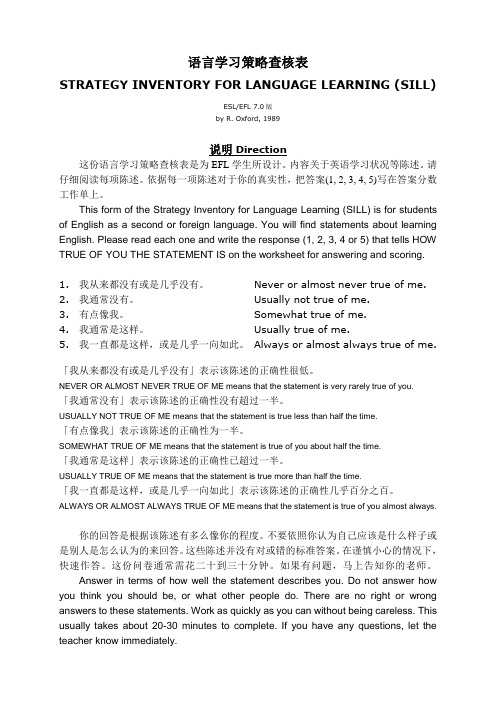
语言学习策略查核表STRATEGY INVENTORY FOR LANGUAGE LEARNING (SILL)ESL/EFL 7.0版by R. Oxford, 1989说明Direction这份语言学习策略查核表是为EFL学生所设计。
内容关于英语学习状况等陈述。
请仔细阅读每项陈述。
依据每一项陈述对于你的真实性,把答案(1, 2, 3, 4, 5)写在答案分数工作单上。
This form of the Strategy Inventory for Language Learning (SILL) is for students of English as a second or foreign language. You will find statements about learning English. Please read each one and write the response (1, 2, 3, 4 or 5) that tells HOW TRUE OF YOU THE STATEMENT IS on the worksheet for answering and scoring.1.我从来都没有或是几乎没有。
Never or almost never true of me.2.我通常没有。
Usually not true of me.3.有点像我。
Somewhat true of me.4.我通常是这样。
Usually true of me.5.我一直都是这样,或是几乎一向如此。
Always or almost always true of me.「我从来都没有或是几乎没有」表示该陈述的正确性很低。
NEVER OR ALMOST NEVER TRUE OF ME means that the statement is very rarely true of you.「我通常没有」表示该陈述的正确性没有超过一半。
- 1、下载文档前请自行甄别文档内容的完整性,平台不提供额外的编辑、内容补充、找答案等附加服务。
- 2、"仅部分预览"的文档,不可在线预览部分如存在完整性等问题,可反馈申请退款(可完整预览的文档不适用该条件!)。
- 3、如文档侵犯您的权益,请联系客服反馈,我们会尽快为您处理(人工客服工作时间:9:00-18:30)。
英语语言学习策略量表SILL(Oxford)
1-完全不符合我的情况;2-通常不是我的情况;3-有时候是这样;4-通常是这样;5-完全符合我的情况
分量表--记忆策略
1.我会思考在英语中学到的新知识与我已有的知识间的联系。
2.为了记忆生词,我尽量使用生词造句。
3.我尽量将单词的音、形、义结合起来记忆单词。
4.为了记住单词,我经常想想在什么情景下这个单词有可能用到。
5.我用英语的节奏来记生词。
6.我将生词写在卡片上以便更好的记忆单词。
7.我借助肢体语言记忆生词。
8.我经常复习英语课文。
9.我通过记忆单词在书页、广告牌或路标上的位置来记忆生词。
分量表—认知策略
10.我通过重复读写来记忆单词。
11.我尝试像以英语为母语的人一样说英语。
12.我经常练习英语的发音。
13.我通过多种方式来运用已经掌握的英语单词。
14.我尝试用英语交谈。
15.我经常看一些英语电视节目或电影。
16.用英语阅读对我来说是一种享受。
17.我用英语记笔记、写便条、信件或报告等。
18.我通常先快速地浏览一下英语短文,然后再从头仔细地阅读。
19.遇到新词时,我通常回想一下它与汉语中哪些单词相对应。
20.我注意总结英语句型。
21.如果知道单词各部分的含义,我就能知道整个单词的意思。
22.我尽量不字对字地直译。
23.对于听到或读到的英语内容,我要作一下总结。
分量表—补偿策略
24.对于不太熟悉的单词我就猜它的意思。
25.在用英语交谈想不起某些单词时,我就借助手势来表达。
26.当不知道应该用哪个单词时,我就用知道的单词造词。
27.在阅读英语文章时,我不会去查每个生词的意思。
28.我尽量预测讲话者将要说什么。
29.如果想不起用准确的单词来表达,我就用意义最相近的单词或
短语来代替。
分量表—元认知策略
30.我通过一切途径来练习英语。
31.我通过意识到自己的错误,来提高自己的英语水平。
32.有人讲英语时,我的注意力非常集中。
33.我试着找出如何学好英语的办法。
34.我制定时间表,以便有足够的时间来学习英语。
35.我注意寻找那些能够和我用英语交谈的人。
36.我寻找一切机会尽可能多的用英语进行阅读。
37.对于如何提高自己的英语技能,我有明确的目标。
38.我经常回想自己在英语学习中的进步。
分量表—情感策略
39.每当感到害怕英语时,我便努力放松自己。
40.尽管我害怕出错,但我还是鼓励自己去讲英语。
41.每当在英语学习取得进步时,我就奖励自己。
42.我尽力去注意在学习或运用英语时自己是否情绪紧张。
43.我在日记中写下自己学习英语的感受。
44.我与他人交流学习英语的心得体会。
分量表—社交策略
45.如果我听不懂,我会请求讲话者放慢速度或重复。
46.当我讲英语时,我请别人改正我的错误。
47.我与其他同学一起练习英语。
48.我经常从英语老师那里寻求帮助。
49.我用英语来提问题。
50.我努力学习英语国家的文化。
